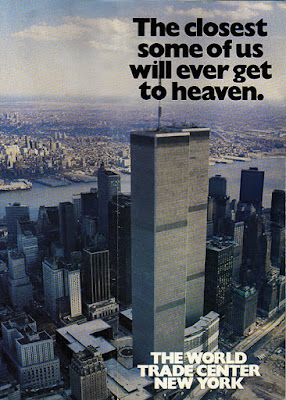The other victims, both in New York and Washington, were killed doing what most of us Americans do everyday - they were going about their regular lives, mostly at their jobs. In that sense they were no different than any of the rest of us. An attack on one was an attack on all.
I cannot comprehend the horror of such an experience. I can only offer feeble condolences to the survivors and to the families and friends of those who died. Such offerings must seem very inadequate after the millionth repetition.
The September 11 attacks have been compared to Pearl Harbor. Ten years after Pearl Harbor, however, World War II had been over 6 years and America had moved on to a different fight (with global Communism). Pearl Harbor had become old news since that attack had been paid back in full. Today, ten years after 9/11, there is no sense of closure. We seem incapable of finding a way to reduce the fear of terrorism. The media is overflowing with every possible angle. People are still trying to figure this out.
Another thing I cannot comprehend is what would lead an ostensibly intelligent adult into becoming a suicide bomber. What manner of dark faith motivates such behavior?
I do regret some of the decisions made by the United States in reaction to the attacks. Foremost among these, of course, is the invasion of Iraq. Many of our country's worst moves were a result of the dark faith of our own leaders, people like Dick Cheney. A clear-headed United States should have recognized their lies. Courageous people, like Michael Moore, who spoke against those bad choices at the time were accused of treason and threatened with violence.
Of course once it became clear that there were no WMDs in Iraq, we needed new excuses. Popular ones were "promoting democracy" and "nation building". No one seems to talk much about fighting for God or controlling their oil reserves.
As a U.S. citizen, voter and taxpayer I regrettably must accept my share of responsibility for the bad decisions of my government. One three-hundred-and-twelve-millionth of the total, if the blame is to be parceled out equally - although in truth, some people are far more culpable than I.
And I must face the sad prospect that I will never see a solution to this conflict. The September eleventh attacks on the World Trade Center and the Pentagon did not start our war between cultures, between religions, between haves and have nots. The attacks merely brought the existing conflict to the attention of the United States populace and provided excuses for our leaders to intensify the battles.
Finding an end to the real conflicts - achieving something one might reasonably call "peace" - seems more unlikely to me now, ten years after 9/11, than it ever has. The sadness of this anniversary goes far beyond the death and destruction caused by four hijacked planes. This gloom shows every sign of becoming a permanent feature of the American experience.
I recommend an article entitled The Long War by Tom Hayden. Here's a couple paragraphs:
But 9/11 produced a spasm of blind rage arising from a pre-existing blindness to the way much of the world sees us. That, in turn, led to the invasions of Afghanistan, Iraq, Afghanistan again, Pakistan, Yemen and Somalia — in all, a dozen “shadow wars,” according to The New York Times. In Bob Woodward’s crucial book, “Obama’s Wars,” there were already secret and lethal counterterrorism operations active in more than 60 countries as of 2009.
From Pentagon think tanks came a new military doctrine of “The Long War,” a counterinsurgency vision arising from the failed Phoenix program of the Vietnam era, projecting US open combat and secret wars over a span of 50 to 80 years, or 20 future presidential terms. The taxpayer costs of this Long War, also shadowy, would be in the many trillions of dollars and paid for not from current budgets, but by generations born after the 2000 election of George W. Bush. The deficit spending on The Long War would invisibly force the budgetary crisis now squeezing our states, cities and most Americans.
The pictures came from here and here.
Sneak Attack Tags: 9-11 attacks. . . terrorism. . . endless war


No comments :
Post a Comment